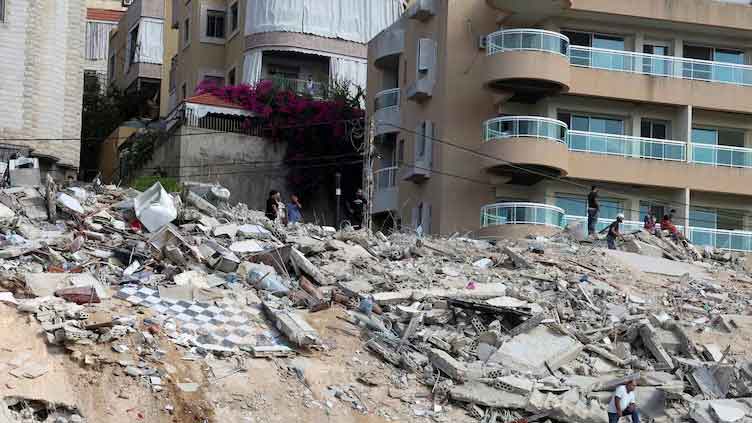Netanyahu tells Iran no part of region out of Israel's reach as land invasion looms

World
Netanyahu tells Iran no part of region out of Israel's reach as land invasion looms
BEIRUT/JERUSALEM (Reuters) - Israel warned Iran on Monday that nowhere in the Middle East was beyond its reach and hinted at a land invasion of Lebanon after assassinating the leader of the Tehran-backed Hezbollah group, one of its biggest adversaries, in a Beirut suburb last week.
"There is nowhere we will not go to protect our people and protect our country," Prime Minister Benjamin Netanyahu said in a three-minute video clip in English that he addressed to the Iranian people.
Friday's assassination of Nasrallah - the most powerful leader in Tehran's "Axis of Resistance" against Israeli and US interests in the Middle East - was one of the heaviest blows in decades to both Hezbollah and Iran.
After two weeks of intensive airstrikes and a string of assassinations of Hezbollah commanders, Israel, which has been training its troops for a ground invasion, indicated that a land invasion was an option in Lebanon.
Speaking to troops deployed along Israel's northern border, Defence Minister Yoav Gallant said Israel would do whatever it takes to ensure the return of citizens who have fled Hezbollah rockets during nearly a year of border warfare.
"We will use all the means that may be required – your forces, other forces, from the air, from the sea, and on land. Good luck," said Gallant, who was briefed by commanders.
"The elimination of Nasrallah is an important step, but it is not the final one. In order to ensure the return of Israel’s northern communities, we will employ all of our capabilities, and this includes you."
The Washington Post cited an unidentified US official as saying Israel had already told the US it was planning a ground operation that may start imminently.
The operation would be smaller than Israel's 2006 war against Hezbollah and focus on security for border communities, the official said.
Asked about the reports, US President Joe Biden, who has so far had little success urging Israel to rein in its campaigns, called for a ceasefire, telling reporters: "I'm comfortable with them stopping."
The Pentagon referred reporters to Israel for questions on any land offensive.
HEZBOLLAH SAYS IT IS READY FOR INVASION
In his first public speech since Israeli airstrikes killed Nasrallah last week, Hezbollah's deputy leader Naim Qassem said his fighters were primed to confront a ground invasion and thwart its aims.
"The resistance forces are ready for a ground engagement," he said in an address from an undisclosed location.
As he spoke, Israeli airstrikes in Beirut and elsewhere in Lebanon continued, extending a two-week-old campaign that has eliminated several Hezbollah commanders but also killed about 1,000 civilians and forced one million to flee their homes, according to the Lebanese government.
The death toll from an Israeli strike on the southern Lebanese town of Ain Deleb rose to 45, Lebanon's health ministry said on Monday. Rescuers stood on a flattened building.
"We are rescuing these people, pulling out the living, the torn apart, and the martyrs," said one, Mazin al-Khatib.
Nasrallah's killing, along with the assassinations and systematic attacks on the group's communications devices, constitute the biggest blow to the Shi'ite movement since Iran created it in 1982 to fight Israel.
Nasrallah built Hezbollah up into Lebanon's most powerful military and political force, with a wide reach across the Middle East.
Now it must replace a charismatic, towering leader who was a hero to millions of supporters because he stood up to Israel - even though the West branded him a terrorist mastermind.
Qassem said it would "choose a secretary-general for the party at the earliest opportunity ... and fill the leadership and positions on a permanent basis".


